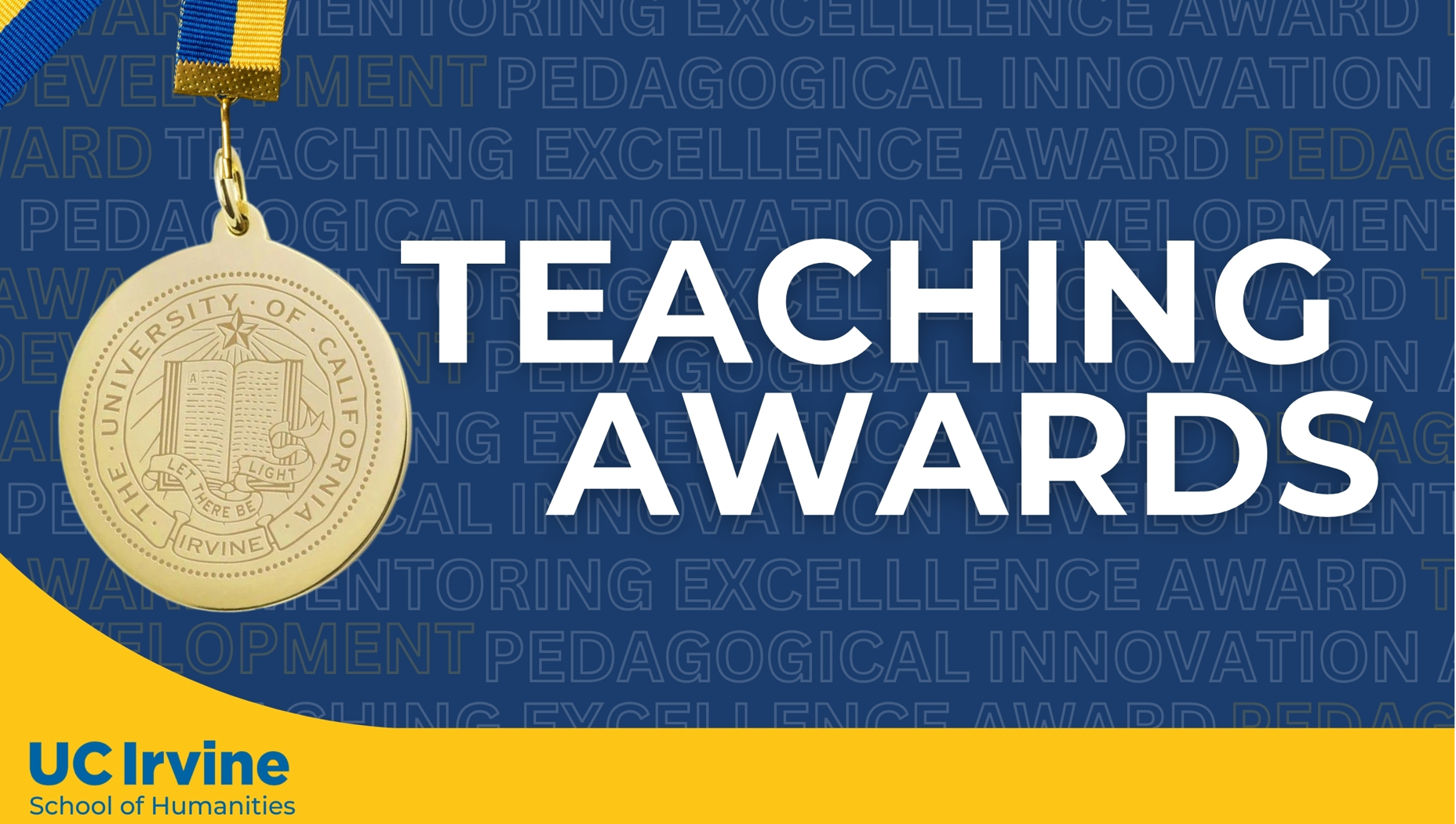
By Nikki Babri
Great teachers don’t just impart knowledge; they inspire, challenge and transform. This year, UC Irvine’s School of Humanities celebrates seven such educators whose innovative approaches are redefining what's possible in humanities education and underscoring the vital role of teaching in shaping our collective future.
Senate Faculty Teaching Excellence
Desha Dauchan and Valentina Montero Roman won the Senate Faculty Teaching Excellence Award for their impactful and innovative approaches to inclusive education.
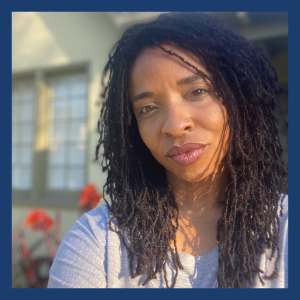
Associate Professor Desha Dauchan has transformed the Department of Film and Media Studies’ curriculum by designing and reimagining courses that cater to UCI's diverse array of aspiring filmmakers and screenwriters. Dauchan's teaching integrates theory and practice through active learning and project-based strategies. She encourages students to cultivate their unique creative voices while developing their craft.
“I am still working on bridging the innovations with traditional practices. More than ever, I value the ‘live experience’ of the classroom as we gather to share ideas and offer critical feedback and encouragement to our students and peers’ creative and scholarly work,” she shares. “The experience of screening, reading, writing and responding collectively immediately in live space is unmatched.”
Dauchan extends learning beyond the classroom by arranging industry guest speakers, internship sessions, field trips and student film showcases. Students and nominators appreciate her thoughtful, engaged and inspiring teaching style that combines hands-on training with critical media analysis skills.
When Valentina Montero Roman, assistant professor of English, joined UCI during the 2020 pandemic, she swiftly adapted her teaching methods to create an engaging, inclusive virtual learning environment.
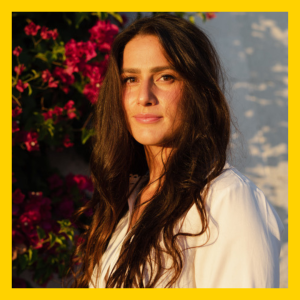
“I wanted my students to feel like we were working together to make sure they got as much out of the class as they could, and that they felt supported through challenging times,” explains Montero Roman. With the help of DTEI specialists and student feedback, she developed flexible course structures with asynchronous participation and innovative writing activities, focusing on making distant subject matter relevant to students’ daily lives.
Her attention to the writing process has made her a sought-after advisor for both undergraduate and graduate students. Nominators lauded Montero Roman's commitment to students and her ability to foster community in virtual settings. This community-building continues outside the classroom through her involvement with the Critical Race Collective, Latinx Humanities Research Cluster and a writing group she founded for junior BIPOC faculty.
Unit 18 Faculty Teaching Excellence
David Branscome and Margaret Speer received the Unit 18 Faculty Teaching Excellence Award for positively impacting students through an inclusive learning environment.

As a lecturer in the Department of Classics, David Branscome consistently introduces new methodologies to accommodate various student learning preferences. Recently, he’s begun incorporating AI tools in his Latin language courses to help students grasp the complexities of translation and the limitations of AI in interpreting nuanced literary texts.
He balances this technological integration with traditional in-person components. “As a teacher, ensuring that courses are accessible for students has become a main goal of mine. Students learn in different ways, and I want to make my courses accessible to all my students,” he explains.
Across course evaluations, students most often remarked on Branscome’s passion for the subject, which aided in making his lectures engaging and complex material more approachable. His nominators praise him as a pillar of the department's teaching. His genuine enthusiasm for the subject, they note, allows him to present material from a fresh perspective and guide students through content in a way that is both accessible and intellectually stimulating.
Coming from a family of educators in the humanities, Margaret Speer, a lecturer and Assistant Course Director in the Department of English’s Composition Program, demonstrates a lifelong commitment to student success – including her incarcerated students in UCI’s LIFTED program. Her teaching philosophy, from Humanities Core to Horror and the Gothic, emphasizes transparency and demystifying the critical thinking process.
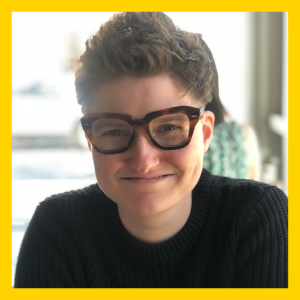
“Information-literacy is more important now than ever,” Speer emphasizes. “My pedagogical priority is to help students make connections between cultural productions like literature and film, history and politics.”
Nominators praise Speer's energetic, generous teaching style and her ability to tailor student feedback. Students appreciate her ability to create an active learning environment where they collaboratively analyze texts and issues. Across diverse courses, Speer adapts her methods to meet individual student needs, fostering an atmosphere that encourages intellectual engagement and real-world application of concepts.
Pedagogical Innovation and Development
Qian Du and Jung-Hsien Lin from the Program in Global Languages and Cultures (GLC) received the Pedagogical Innovation and Development Award for their collaboration in creating a bilingual academic writing course taught in Chinese and English.
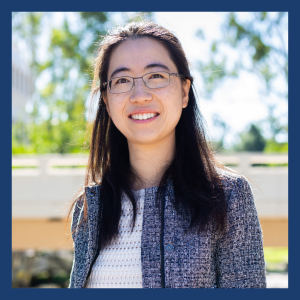
Associate Professor and Associate Director Qian Du's teaching philosophy, centered on multilingualism and cultural diversity, is reflected in her bilingual writing classes. By implementing class activities where students interact with AI tools in multiple languages, students learn to recognize the complexities of writing in the modern era and the importance of using technological tools responsibly.
Du emphasizes the importance of students recognizing their multilingualism as an asset, not a deficit. “This shift in perception,” she explains, “will empower them to continue leveraging their linguistic diversity as a strength in their academic and future professional endeavors.”
Nominators commended Du and Lin for fusing generative AI and VR/XR technologies into their course to challenge traditional notions of “Standard Academic English.” The impact has been significant, with students showing increased engagement and confidence in their language abilities both academically and personally.
For Jung-Hsien Lin, a multilingual educator herself, the award holds personal significance. “Winning this award underscores the importance of using emerging technologies like generative AI and VR/XR in our teaching methodology. It highlights our commitment to fostering an inclusive learning environment that respects and values each student's unique background and abilities,” Lin, a lecturer and the Assistant Director of GLC, shares.
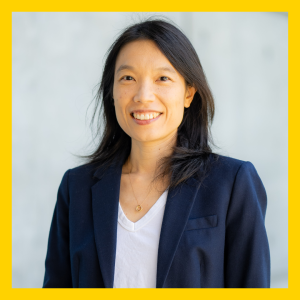
As director of the Intercultural Communication Lab, she has incorporated VR/XR into her courses to expand learning modalities and create immersive experiences. Lin’s teaching pedagogy centers on inclusiveness and is constantly evolving in response to changing work conditions, technological advancements and cultural dynamics. This, she hopes, ensures that her students are equipped to navigate and succeed in a rapidly changing world.
“By keeping the core values of the humanities in mind while embracing new technologies and methodologies, we can provide students with a comprehensive education that prepares them for the complexities of the modern world,” adds Lin. “This commitment to innovation and inclusivity ensures that our teaching remains relevant and impactful, helping students navigate and succeed in a dynamic and diverse global landscape.”
SOH Mentoring Excellence
Ben Garceau, a lecturer in Humanities Core, won the Mentoring Excellence Award for his steadfast mentorship of undergraduate students, particularly in the UTeach program, which gives students the opportunity to design and teach their own courses.
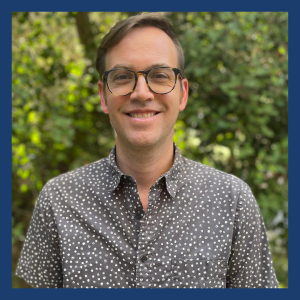
Garceau believes that building ideas is a social process and emphasizes the value of in-person discussions and writing. While he acknowledges the importance of digital tools, he encourages students to recognize that these cannot replace critical thinking and understanding.
His teaching philosophy centers on empowering students to take ownership of their academic growth. “Moving from a passive mindset to an active mindset, in which students seek answers to their own questions, is one of the most important transformations in higher education,” Garceau explains. This begins with making his classroom an open, non-judgmental environment that encourages participation from all students.
To further build students’ confidence, Garceau strives to break down classroom hierarchies by positioning himself as a “first among equals” rather than an authority figure. As UTeach Faculty Coordinator, he mentors student teachers, treating them as colleagues and fostering their unique teaching styles. Nominators praised his holistic approach to mentoring, noting his constructive guidance and added emotional support for first-time teachers who are vulnerable as they test new ideas.
Congratulations to these exceptional educators! The School of Humanities thanks you for your dedication to student success and inclusive education.
Interested in reading more from the School of Humanities? Sign up for our monthly newsletter.
